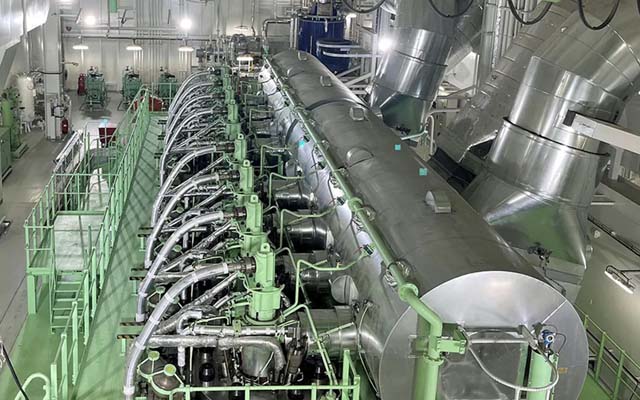A.P. Moller-Maersk has celebrated the naming of its latest dual-fuel methanol container vessel ‘Alexandra Maersk’ at the Port of Felixstowe, UK.
Alexandra Maersk is the sixth vessel in Maersk’s owned fleet being able to sail on methanol in its main and auxiliary engines. It is the fifth in a series of 18 large dual-fuel methanol vessels scheduled for delivery in 2024 and 2025. Each can carry more than 16,000 TEU. The godmother of the vessel is Elaine Condon, a director of fashion retailer Primark, an important Maersk customer.
Mike Kane, UK Maritime Minister, said: “It’s a privilege to join the naming ceremony for the Alexandra Maersk – one of the first container vessels to run on green methanol. This is exactly the kind of innovation we need to deliver a greener, cleaner maritime sector which is better for people and for our planet. Delivering greener transport is one of our top priorities and we will do so by reducing harmful greenhouse gas emissions and investing in alternative fuels and technologies.”
Primark CEO Paul Marchant added: “We are committed to reducing the impact we have on the environment across our entire operation, including our supply chain. Through our partnership with Maersk we have started to introduce green fuel alternatives, such as Biofuel, when shipping our products. By using Maersk’s ECO Delivery Ocean product and replacing fossil fuels with green fuel alternatives on Maersk’s cargo ships, we are reducing greenhouse gas (GHG) emissions in our ocean shipping. This is a really important step for us at Primark as it supports our ambition to halve our carbon emissions across our value chain by 2030.”
Maersk’s ECO Delivery Ocean is based on reduced GHG emission fuels like bio-diesel which is used on vessels across the Maersk fleet, and now also green methanol.
Vincent Clerc, CEO A.P. Moller-Maersk said: “It’s great to see customers like Primark taking action and partner with us to decarbonise ocean transport. True progress in the green transformation requires collective effort. To accelerate the transformation, we need the International Maritime Organization help closing the price gap between green and fossil fuels to make the green choice the best choice for all. Last week’s IMO meeting on that matter was a step in the right direction, but much work remains in the coming months. We remain hopeful and continue to do all in our power to progress the green transition of shipping.”
The new methanol enabled ships are at the core of Maersk’s ambitious decarbonisation plans as low emission methanol can reduce GHG emissions by 65% to 90% compared to conventional fossil fuels such as bunker oil (depending on the feedstock and production process of the methanol, calculated on a life cycle basis). Maersk has set itself ambitious goals for decarbonising logistics on ocean and across its whole business with a net-zero target in 2040. The pathway to net-zero has been tested and approved by the Science Target Based initiative (STBi). Reduced GHG emission fuels are key to achieving the target. The exact emission reduction of green methanol depends on the production process and how feedstock and produced methanol is being transported. While methanol made from biogenic feedstock reaches around 65-70% GHG emission reduction on a life cycle basis compared to conventional fossil fuel, the synthetically produced green methanol, the so called e-methanol, aims to reach much higher levels of GHG emission savings of up to 90% on a life cycle basis.
Following the tradition of naming Maersk vessels after members of the founding family, Alexandra Maersk is named after Alexandra Mærsk-Møller (1868-1953) who was an older sister of A.P. Møller, the founder of A.P. Moller-Maersk.
Image: Methanol-fuelled engine, ‘Alexandra Maersk’ (credit: A.P. Moller-Maersk)



